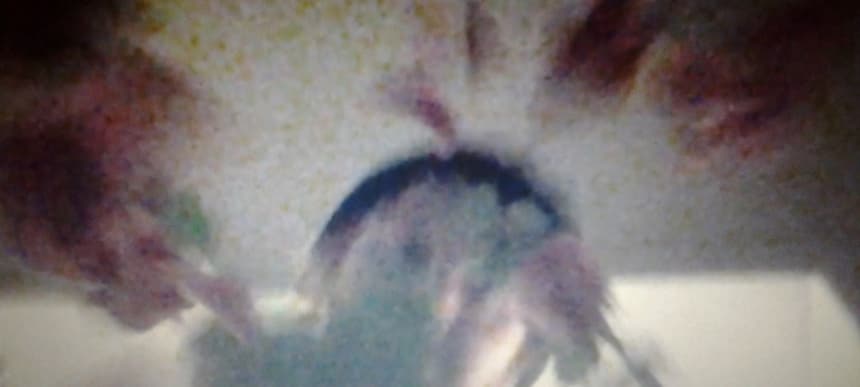
Next: Fis
“Writing music for me is a language-less thing,” says New Zealand producer Olly Peryman aka Fis, the newest signing to the consistently progressive Tri Angle label. “It’s bodily. If I’m going over a track that I’m making, it’s almost as if it’s playing in my ribcage. That whole area in the torso is really important. It’s almost the guide or the arbiter of a work. If there’s a particular feeling in my sternum or in my neck then I generally know the track’s worth pursuing: it has the qualities of a work that I want to finish and claim as mine.”
Feeling over thought shapes the experience of listening to Fis. His music is heavy with a sense of residue: sounds crash, groan and career into one another as if they are tripping across some ravaged landscape. He talks about letting sound guide itself in the process of writing and the physicality of that notion – of one note leading the rest across an unstable expanse – resonates deep on the ‘Preparations’ EP, his debut release for Tri Angle.
While rhythmically all four tracks tread different, often thorny, paths, a ritualistic quality winds throughout the EP. Drums are pounded in and out of time, small metallic objects are trodden underfoot, synthetic winds howl. It is only the strung-out strains of Mildew Swoosh that leave a clue to Peryman’s musical past. “It’s been a good four or five years since I was really vibing off drum and bass. I think there are perhaps, in terms of sound palettes, some motifs – definitely with my emphasis on sub-bass. There is some residue of a drum and bass interest there in what I’m doing. I don’t call what I’m doing drum and bass. I don’t actually call what I make anything, for the record.”
"If there’s a particular feeling in my sternum or in my neck then I generally know the track’s worth pursuing: it has the qualities of a work that I want to finish and claim as mine.” – Fis
While the tactile qualities of his music and popular ideas of New Zealand’s majestic landscape lend themselves to drawing parallels, Peryman is wary of being understood as a writer of place. “If we're gonna discuss my relationship with place then that conversation needs to be founded on the understanding that the Taranaki Whanui, and more specifically Te Ati Awa [a Māori tribe in the Wellington region], are mana whenua [authorities over the land] in the areas where these works were created. Of course, I was physically present in Wellington whilst writing ‘Preparations’, and yes the EP's probably coming from an immersive ontology, but at the same time it's not an autotopographic exercise or some kind of claim to a deep, ancestral connection with the landscape. For me to make those claims as a Pākehā/Tauiwi [Māori terms for New Zealanders of European descent], that's kinda heading down the all-too-familiar 'erasure avenue' right?”
His concerns are well-founded: “I think in the past a lot of New Zealand musicians, particularly white New Zealand musicians, have embarked on nationalistic endeavors with their music and almost enshrined a deep sense of belonging in New Zealand with their music. They’ve never really made those sorts of acknowledgements and that makes the music a neocolonial kind of act.”

The artwork for 'Preparations', made by Fis based on drawings of all four EP tracks.
Peryman works part-time in a junior faculty role at the University of Wellington’s Te Kura Māori school, which focuses on Māori education studies. “Western learning at the moment, as far as we understand it in public education systems and so on, it has a real industrial basis to it. Really individualised, really competitive.” The Māori approach to education of collectivism and co-operation stands in almost direct contrast to the western system’s economic-focused values, says Peryman. He relishes working at the school: “It is certainly invigorating but it also feels like a safe place to be among peers. It’s almost like a retreat in a way.”
“I definitely cherish my production time. It’s like a treat. It’s also necessary because the writing’s a release.” – Fis
In between his time at Te Kura Māori [kura means place of learning in Māori] and working evenings and weekends at a bottle store, he has around 10 hours a week to make music. That time constraint requires a certain level of focus, something that’s become more difficult with age. As a kid he would “just sit at a piano and get lost” or “play the drums for hours” but now he finds he must make a conscious effort to get into that language-less mode. “I definitely cherish my production time. It’s like a treat. It’s also necessary because the writing’s a release.”
While in the moment of writing Peryman feels his way through sound, it is only recently that he has allowed himself to reflect on where the music might be coming from – or what it is dealing with. His mother died when he was a small child and he wonders whether part of the drive behind his music making is to process that trauma. “Perhaps it’s just me trying to make sense of where the energy of a writing comes from because I sometimes have no idea.”
He grew up in a suburban village on the outskirts of New Zealand’s capital, Wellington, which is situated on the southern tip of North Island. Music played a big role in his childhood: “It was always a happy thing in the house.” He talks about his father’s huge record collection that was largely compiled during a stint in the UK as a drummer playing modern jazz in the late 60s and early 70s. He would often play them when Peryman was growing up: “The music was always something with a rhythmic or percussive quality to it.” His grandfather, too, was a musical man, often found at the piano.
These divulgences lead me to draw a comparison with CE Visions on ‘Preparations’, with its distant drums and melody appearing in glimpses in-between the roar of a wave. When I make a clumsy, first-thought link to his father’s drums and granddad’s piano as sonic presences in his life, Peryman responds in typically mindful fashion: “When I’m making it the representations aren’t that direct and deliberate. That wouldn’t be my call but I wouldn’t stand in your way if you wanted to understand it in that way.”
"The track is performing itself on the sound stage in a visual sense while I am making things." – Fis
In fact, he later goes on to explain, CE Visions was born out of his working process. To save his flatmates’ ears during late night writing sessions he works mainly on headphones. He talks about the “sound stage” that headphones production privileges: a sense of a plane through the skull on which the track is playing. “For me, that’s a complete performance – the track is performing itself on the sound stage in a visual sense while I am making things. The name of CE Visions comes from what I was envisioning on that plane.” He often stops and draws the tracks, creating visual representations of the music playing in his body, examples of which can be seen on the artwork for 'Preparations'.
The week before the release of ‘Preparations’ will see another Fis record make its way into the world. The ‘Homologous’ EP on new label Void Coms gathers three tracks on a more granular theme: “Yeah, those tracks are grey and black. It’s kind of desolate, austere and almost atonal in its character that whole release – the music and the imagery.” While Peryman is guarding the details for now he does admit he hopes to be working on a longer form release next year, yet it will still only be the tip of the iceberg in terms of his body of work. “It’s fair to say that about 5% or 10% of what I’ve written and finished has actually been made public. I imagine that ratio will stay the same. I am at the moment getting a lot of my stuff cut to dubplates that I’ll play out in sets. I’d like to keep things reserved for that time and place. I will be playing stuff that definitely won’t be online.”
Tri Angle will release 'Preparations' on 18th November 2013. Void Coms will release 'Homologous' on 11th November 2013.













